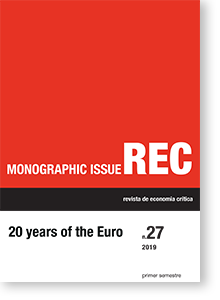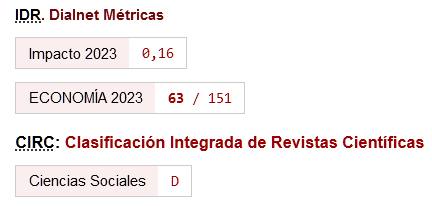Completing the Euro: The Euro Treasury and the Job Guarantee
Resumen
The problems with the design of the Eurozone came into focus when, late in 2009, several member nations – notably Greece – failed to refinance their government debt. The crisis that followed was not entirely a surprise. When the Euro was launched in 1999, many economists warned that the single currency was unworkable. Even Eurozone optimists argued that the Euro project would eventually need to be completed. More than 10 years after the crisis, unemployment rates remain elevated and continuing to threaten the social, political and economic stability of the Eurozone. The institutional constraints of the single currency however preclude bold action to address these challenges. In this paper, we suggest that tackling the twin problems of the Eurozone – its institutional flaws and mass unemployment – could be addressed by creating a Euro Treasury that would finance a Job Guarantee program, which would eliminate mass unemployment, enhance price stability, and foster social and economic integration across Europe.
Descargas
Citas
Ayala, Iván H. (2018): "Populismo progresista y autoritarismo xenófobo en Europa", Documentos de trabajo del Instituto Complutense de Estudios Internacionales: Nueva época, 4, 1.
Barredo-Zuriarrain, Juan; Molero-Simarro, Ricardo; Quesada-Solana, Alejandro (2017): "Euro-Dependence-A Peripheral Look beyond the Monetary Union: A Proposal of Reform of the TARGET2", Review of Radical Political Economics, 49(3), pp. 375-393.
https://doi.org/10.1177/0486613417703958
Bibow, Jörg (2013): "Lost at Sea: The Euro needs a Euro Treasury", Levy Economics Institute Working Paper no. 780.
https://doi.org/10.2139/ssrn.2358070
Bibow, Jörg (2019): "How to redesign the fiscal regime of the Eurozone: an alternative take on lessons from US and Eurozone experiences", ETUI working paper 2019.02.
https://doi.org/10.2139/ssrn.3350977
Cesaratto, Sergio (2015): "Balance of payments or monetary sovereignty? In search of the EMU's original sin, Comments on Marc Lavoie's "The Eurozone: similarities to and differences from Keynes's plan"", International Journal of Political Economy, 44, pp. 142-156.
https://doi.org/10.1080/08911916.2015.1060830
Cruz Hidalgo, Esteban; Parejo Moruno, Francisco. M.; Rangel-Preciado, Francisco, J. (2019): "El equivalente general en la génesis del dinero de Marx: el dinero como criatura del Estado", DT-AEHE nº1905.
Ehnts, Dirk H. (2016): Modern Monetary Theory and European Macroeconomics, Abingdon (UK): Routledge.
https://doi.org/10.4324/9781315623030
Eriksson, Stefan; Rooth, Dan-Olof (2014): "Do Employers Use Unemployment as a Sorting Criterion When Hiring? Evidence from a Field Experiment", American Economic Review, 104, pp. 1014-39.
https://doi.org/10.1257/aer.104.3.1014
European Commission (2015): "Completing Europe's Economic and Monetary Union", [https://ec.europa.eu/commission/sites/beta-political/files/5-presidents-report_en.pdf](https://ec.europa.eu/commission/sites/beta-political/files/5-presidents-report_en.pdf)
Febrero, Eladio; Uxó, Jorge; Bermejo, Fernando (2018): "The financial crisis in the eurozone: a balance-of-payments crisis with a single currency?", Review of Keynesian Economics, 6(2), pp. 221-239.
https://doi.org/10.4337/roke.2018.02.04
Goodhart, Charles (1997) "One Government, One Money", Prospect Magazine, pp. 1-3.
Goodhart, Charles (1998): "The Two Concepts of Money: Implications for the Analysis of Optimal Currency Areas", European Journal of Political Economy, 14, pp. 407-32.
https://doi.org/10.1016/S0176-2680(98)00015-9
Lavoie, Marc (2013): "The monetary and fiscal nexus of neo-chartalism: a friendly critique", Journal of Economic Issues, 47(1), pp. 1-32.
https://doi.org/10.2753/JEI0021-3624470101
Lavoie, Marc (2015): "The eurozone: similarities to and differences from Keynes's plan", International Journal of Political Economy, 44(1), pp. 3-17.
https://doi.org/10.1080/08911916.2015.1035980
Lerner, Abba P. (1943): "Functional Finance and the Federal Debt", Social Research, 10(1), pp. 38-51
Lerner, Abba P. (1957): Economía del Pleno Empleo, Madrid: Aguilar S.A. de Ediciones.
López-Castellano, Fernando; García-Quero, Fernando (2019): "The Euro System as a Laboratory for Neoliberalism: The Case of Spain", American Journal of Economics and Sociology (Accepted, awaiting publication).
https://doi.org/10.1111/ajes.12261
Meyer, Robinson (2018): "The Democratic Party Wants to Make Climate Policy Exciting", The Atlantic, December 4: [https://www.theatlantic.com/science/archive/2018/12/ocasio-cortez-green-new-dealwinning-climate-strategy/576514/](https://www.theatlantic.com/science/archive/2018/12/ocasio-cortez-green-new-dealwinning-climate-strategy/576514/)
Mitchell, William (2016): La distopía del euro. Pensamiento gregario y negación de la realidad, Berlin: Lola Books.
Mitchell, William; Mosler, Warren (2002): "Fiscal policy and the job guarantee", Australian Journal of Labour Economics (AJLE), 5(2), pp. 243-259.
Mosler, Warren (1997): "Full employment and price stability", Journal of Post Keynesian Economics, 20(2), pp. 167-182.
https://doi.org/10.1080/01603477.1997.11490146
Pâris, Pierre; Wyplosz, Charles (2014): "PADRE: Politically Acceptable Debt Restructuring in the Eurozone", Geneva Reports on the World Economy Special Report 3, ICMB and CEPR.
Portella-Carbó, Ferran; Dejuán, Óscar. (2018): "Trade Imbalances and Fiscal Policy in the Eurozone: An Analysis of Economic Interrelations with a Global Supermultiplier Input-Output Model", Cambridge Journal of Economics, bey011.
https://doi.org/10.1093/cje/bey011
Soy, Antoni (2014): "La crisis del euro y su futuro", Revista de Economía Crítica, 17, pp. 4-19.
Tcherneva, Pavlina R. (2012): "Employer of Last Resort" in John E. King (ed.) The Elgar Companion to Post Keynesian Economics, Northampton, MA: Edward Elgar, pp. 161-166.
Tcherneva, Pavlina R. (2013a): "The job guarantee: delivering the benefits that basic income only promises-a response to guy standing", Basic Income Studies, 7(2), pp. 66-87.
https://doi.org/10.1515/bis-2013-0010
Tcherneva, Pavlina R. (2013b) "Reorienting Fiscal Policy: A Critical Assessment of Fiscal Fine-Tuning", Levy Economics Institute Working Paper No. 772
https://doi.org/10.2139/ssrn.2318045
Tcherneva, Pavlina R. (2014): "Reorienting fiscal policy: A bottom-up approach", Journal of Post Keynesian Economics, 37(1), pp. 43-66.
https://doi.org/10.2753/PKE0160-3477370105
Tcherneva, Pavlina R. (2017): "Unemployment: The Silent Epidemic", Levy Economics Institute Working Paper no. 895.
https://doi.org/10.2139/ssrn.3025544
Tcherneva, Pavlina R. (2018): "The Job Guarantee: Design, Jobs and Implementation", Levy Economics Institute Working Paper no. 902.
https://doi.org/10.2139/ssrn.3155289
Tymoigne, Eric (2016): "Government monetary and fiscal operations: generalising the endogenous money approach", Cambridge Journal of Economics, 40(5), pp. 1317-1332.
https://doi.org/10.1093/cje/bew012
Uxó, Jorge; Álvarez, Ignacio; Febrero, Eladio (2018): "Fiscal space on the eurozone periphery and the use of the (partially) balanced-budget multiplier: The case of Spain", Journal of Post Keynesian Economics, 41(1), pp. 99-125.
Descargas
Publicado
Cómo citar
Número
Sección
Licencia
Esta licencia permite a terceros compartir (copiar y redistribuir el material en cualquier medio o formato) y adaptar (remezclar, transformar y crear a partir del material para cualquier finalidad, incluso comercial), siempre que se reconozca la autoría y la primera publicación en esta revista (La Revista, DOI de la obra), se proporcione un enlace a la licencia y se indique si se han realizado cambios en la obra.







